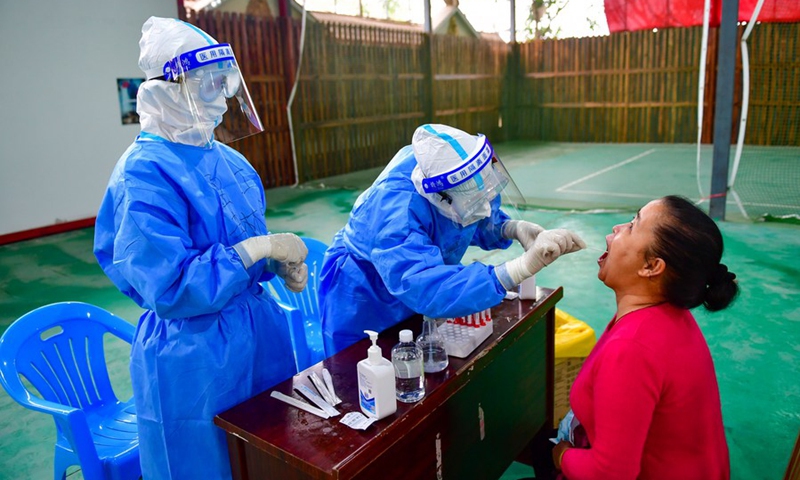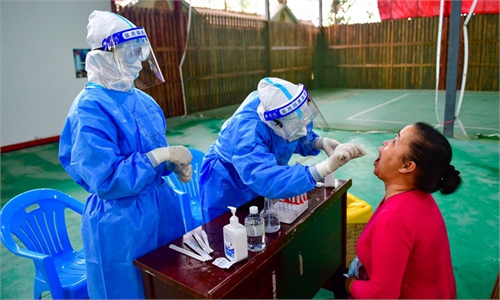Intermittent coronavirus outbreaks in Ruili, Yunnan, cripple local jewelry industry

A medical worker takes a swab sample from a woman for COVID-19 testing at a testing site in Ruili City, Southwest China's Yunnan Province, April 6, 2021.(Photo: Xinhua)
Jade vendors in Ruili city, Dehong Prefecture ,Yunnan Province, which borders Myanmar, is facing unprecedented pressure following Covid-19 outbreaks that have caused the city being placed in on-again-and-off-again lockdowns since last year.
The tightened prevention measures has weighted on cross-border jade and jewelry business, which has been a pillar of local economic growth.
Dehong Prefecture reported 211 accumulative cases, including three new infections. The sporadic outbreak caused by imported cases has thrown the region in a constant exposure of the virus.
Vendors in Ruili said their stores have largely been shut down since April, making it hard for them to sustain their business.
"We have goods that valued hundreds of thousands to a million of yuan waiting to be delivered but due to the virus, the delivery service has all been suspended," a manager with a local jewelry store surnamed Li told the Global Times on Thursday.
For those who chose to sell their products via livestream broadcasting found it is impossible after a government decision to uphold a ban on the activity as part of the efforts to stop the risk spreading infection.
Individuals who violate the regulation will have their stores closed or their business licenses revoked. Jewelry and jade, and electronic devices used for live-streaming will also be confiscated, according to a local government statement.
According to public information, Ruili currently has 10 live-stream broadcasters, with the sales scale in 2020 exceeding 10 billion yuan. Three out of 10 people engaged in the city was in jewelry live broadcasting business, media reported.
Vendors that the Global Times approached agreed the importance of the strict virus prevention measures but expected such regulation could be carried out more scientifically in a way that enables businesses to operate.
A vendor surnamed Hu has found hard to make a living during the lockdown. Hu is not a local resident, and intended to leave the city to find new opportunities after the local jade business suspension.
However, in order to take their jade related products with them, they need to apply for special verification that proves their products are their private possessions, which can be difficult to get through, amid the citywide lockdown, said Hu.
The border of Ruili is 169.8 kilometers long. In November last year, up to 100,000 Myanmar nationals were working and doing business in Ruili. The special economy and culture in the region means a big challenge for epidemic prevention and control there.
During the past year, Ruili city has been shut down three times due to intermittent outbreaks.
In mid-September last year, a small outbreak transmitted by individuals sneaking into Ruili caused a city-wide lockdown. Ruili reported a second outbreak in March, leading to another round of lockdown which last until late April.
The most recent lockdown started on July 7, after local cases caused the closure of the city's main urban district, with all residents required to quarantine at home.

